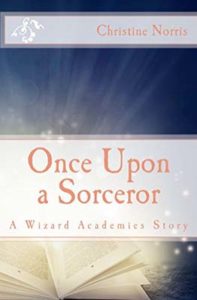Guest Post: Who Goes to Magic School, Anyway?
This Guest Post is by author Christine Norris, who is both a writer and a school librarian. It is very likely that she is the librarian at a magical school. She has that look about her.
Hi! *waves to all the people*
Jagi asked me to write a guest post for the Magic School blog because I’ve written a couple of books about well, a magic school. I’ve known for about a month and I’m sitting here writing it on the weekend before it’s due. Such a student thing to do, a writer thing to do, I guess. But anyway, when she asked I had no idea what I would write about that wouldn’t be completely boring and overdone.
Then I got to thinking about all the books I’ve written. There have been a few, nearly a dozen. They’re all fantasy and have magic of some kind or another, and that got me thinking some more about the characters I’ve written and how they come to be practitioners of magic. And then I decided that’s what I would write about. I do hope it’s not boring and overdone.
In my two Wizard Academies stories (which started out as a shared universe project that never really went anywhere, so I published them myself, just to have available to people), Kingsbridge Academy is very much like Hogwarts. Students are selected because they have the predisposition to be wizards, have displayed magical abilities. Penny Miller, the main character, comes from a long line of wizards who attended the school (as her mother always reminds her), but her best friend Lucy, is Mundae (Muggle) born. Just like those students in Harry Potter, it seems to be something in the DNA that allows them to have their special abilities.
I think it’s that way in many stories about magic school — certainly The Magicians is another variation on that theme.
But is it the only way to learn magic, to be born to it? In my other series, The Library of Athena, the main character, Megan, begins as a regular teenager, never having been touched by magic. Circumstances and a lot of running later, she becomes The Librarian, the sole protector of a huge cache of rare and potentially world-destroying items. The person who built the library became a wizard later in life, and so Megan decides to learn magic as well. It includes learning a lot of Latin, some wand waving, and intention to change something. Completely different than HP and/or most magic school stories. (In my first book, Talisman of Zandria, there is a wizard, and a boy who is his apprentice, but the idea of being predisposed to magical ability never seems to come up. Hmmm…)
As much as I love Harry Potter and magic school stories (if you saw my new tattoo you’d know just how much I love them. Universal Studios this August, here we come!!!), I rather like the idea that magic could be accessible to anyone who desires it, that it’s an ability anyone can learn. I suppose it’s like the idea of talent; is it innate or the result of dedication to practice?
Which do you like more, the idea of being born to magic, or being able to learn?
*
See Once Upon a Sorcerer on Amazon
Find out more about Christine Norris at her blog
Twitter and Instagram: @cnorrisauthor


A little bit of both, just like real life. The issue of course, is that in real genetics, there is a regression to the mean, so, if you have a group or society whose goal is essentially eugenics emphasizing magical ability, then the society will be organized around maximizing the advantages of using the magical system, while minimizing the negative consequences. This would result in increase in magical ability in the top performers in that society over thousands of years.
Wizards vs. Muggles universes always risk turning the story into a Very Important Message about racism. (Not necessarily a bad thing, but sometimes another story wants to be told.)
But of course any story where only some people know about magic (whether it’s innate or learned) has to have an explanation of why; and the “Masquerade” (TVTropes’s term) is harder to maintain if just anyone can learn magic. And you need an explanation of why not everything is done with magic.
So in a sense, the world-building can be much harder to do well in a universe where everyone can learn magic—but of course proper world-building is an essential part of the Fantasy genre, and is appreciated by readers as much as other aspects of the story. I guess I’ll just have to read your Library of Athena books for comparison…